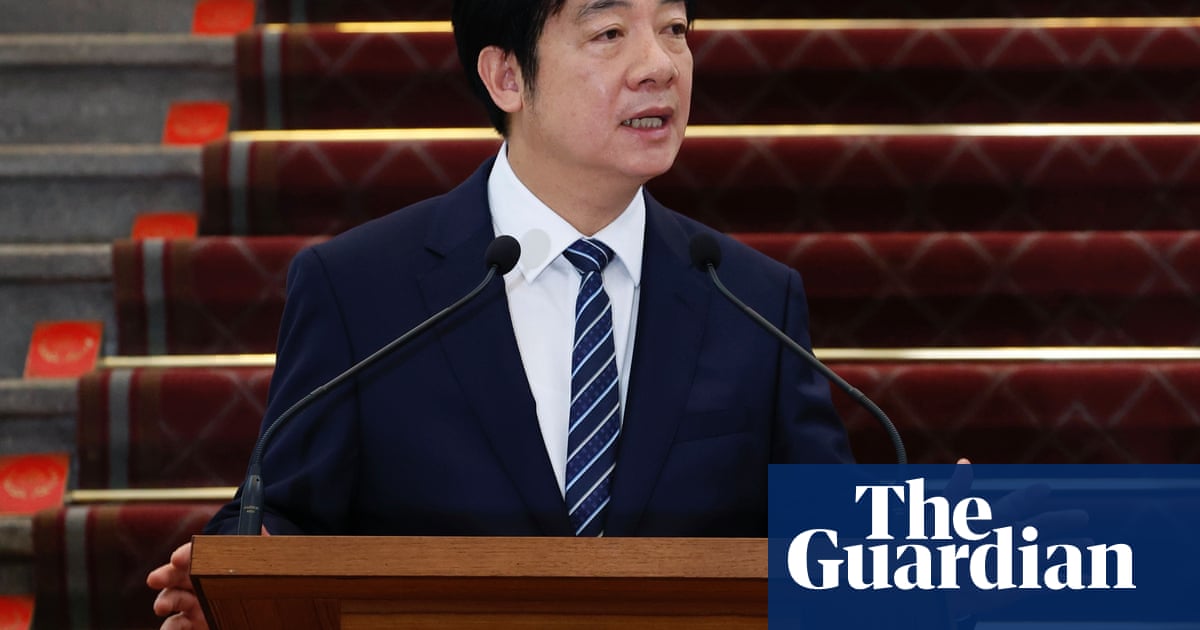Taiwan’s president has reiterated calls for peace and dialogue with China as he marked one year in office, amid heightened Chinese military activity and worsening political division at home.
Lai Ching-te, who wasinaugurated a year ago, told reporters on Tuesday that a war would have “no winners”, but Taiwan would continue to strengthen its defences to ward offa Chinese invasion or attempt to annex it by force.
“It is the aggressor who undermines peace … Taiwan is a peace-loving nation, and our society values goodwill,” he said on Tuesday in response to questions after his formal address. “I am deeply committed to peace, because peace is priceless, and in war there are no winners.”
“However, whilst our pursuit of peace is sincere, it must not be naive.”
He urged Beijing to restart dialogue with his government on equal terms, “using exchanges to replace hemming in, dialogue to replace confrontation”.
China’s ruling Communist party (CCP) cut all ties and dialogue with Taiwan’s government when Lai’s predecessor,Tsai Ing-wen, won the 2016 election for their pro-sovereignty Democratic Progressive party. The CCP considers the party to be unlawful separatists.
In response to the president’s speech, China’s official state media, Xinhua, accused Lai of “deliberately escalating” cross-Strait tensions.
“Since taking office, the Lai Ching-te administration has brazenly pursued ‘Taiwan independence’ to serve partisan and personal gain, charging headlong down a path of division and confrontation that threatens the peace and stability of the Taiwan Strait,” it said.
In recent weeks China’s military launched larger than usual numbers of planes and ships into Taiwan’s air defence identification zone – an average of about 20 planes and 11 navy and coastguard ships each day.
Taiwan authorities had publicly warned of likely Chinese retaliation or pre-emptive activity in response to the speech. Last week government officials told reporters they couldn’t rule out military drills in the days after Lai spoke, and on Monday the coast guard said Beijing could launch “political warfare” to disrupt public morale in Taiwan.
Lai has taken a morepublicly assertive stance against China’s aggressionthan his predecessor Tsai, which analysts had been expecting his inauguration anniversary speech to continue. Earlier this month he saidTaiwan was facing a similar threat to Europe in the 1930s.
However the speech on Tuesday in the end made no mention of China or its annexation plans, and his related comments only came in response to questions in the subsequent press conference. Instead the speech focused on domestic pledges to reduce carbon emissions, plans to deal with the US Trump administration’s punitive tariffs, and domestic political turmoil.
“The trade de-escalation reached between Beijing and Washington has generated anxiety in Taipei over whether the issue of Taiwan may emerge in future US-China talks,” said Amanda Hsiao, a director in Eurasia Group’s China practice, referring to fears Beijing may seek a softening ofthe US’s longstanding support of Taiwan. “This uncertainty may be a factor for why Lai chose not to reiterate his views on the China threat in a high profile speech.”
Amid worsening domestic political turmoil Lai announced he would offer national security briefings to the chair of the main opposition party, the Kuomintang (KMT). The KMT and another rival party, the TPP, control the majority of seats in Taiwan’s legislature and have been accused of blocking Lai’s agenda.
The opposition parties have accused Lai and his Democratic Progressive party of increasing tensions with China and stifling opposition.In the name of national security, Lai’s administration has increasedscrutiny of Chinese-born people in Taiwan, and cracked down on public statements that support Beijing’s goals.
The KMT welcomed the new briefings as Lai having “finally taken a small step” to end partisan conflict, but said he had much more to do.
